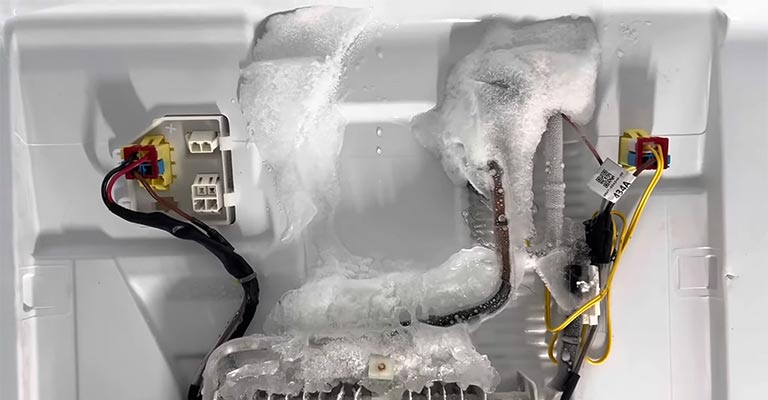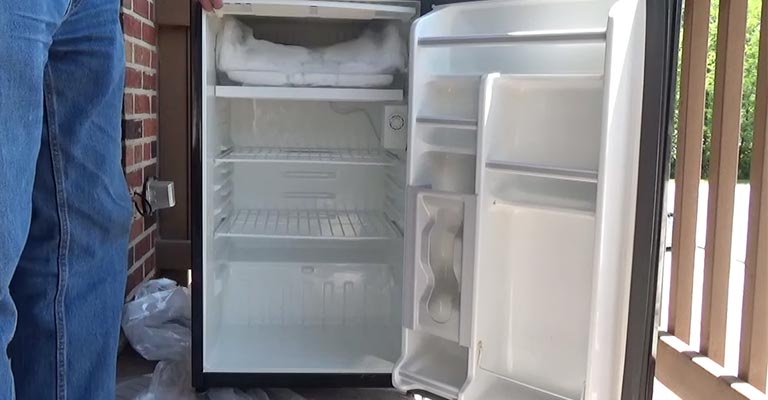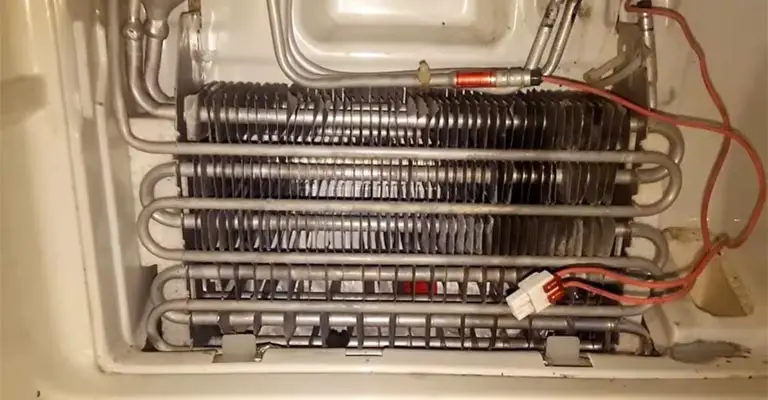If you’ve recently noticed an unexpected buildup of frost in your freezer, you’re not alone. Many people encounter this issue, and it can be both puzzling and inconvenient.
Frost accumulation inside a freezer can lead to various problems, including reduced cooling efficiency and potential damage to stored food items.
An accumulation of frost on the walls and shelves of a freezer is known as freezer frosting. If there is too much moisture in the freezer or there is a fluctuation in temperature, this can happen.
A freezer can also frost when air enters, which brings humidity and causes the liquid to freeze. The most likely reasons are as follows:
Problem With The Defrost Heater Element
There is a problem with your defrost heater element and it needs to be replaced. All modern refrigerators handle defrosting automatically by gently heating the evaporator coils every 24 hours or so to remove any accumulated frost.
It is similar to the heater found in hair dryers, barbecue starters, and gas clothes dryers, which sometimes fail.
Too Much Fresh Air
There is too much fresh air entering the fridge because the door is open too long, too often. There is also a possibility that this will occur if the door seals are poor and allow air in or out. Warm, humid climates make this situation even worse.
Faulty Control Unit
It appears that your refrigerator’s control unit is not working properly, causing the defrost cycle to not operate. A modern refrigerator has an electronic timer or computer that decides when and how long a defrost cycle should run.
Malfunctioning Control Electronics
The heater element may appear to be defective, but if the control electronics are malfunctioning, it won’t fix the issue.
Most often, it’s a malfunctioning heater element, but it’s also possible that it’s a malfunctioning control electronics. If you’re unsure whether the heater element is working, you can conduct a continuity test.
There is a possibility (and unlikely) that you have a poor connection on your wiring harness to the heater element if it is.
My Freezer Has All Of A Sudden A Lot Of Frost Buildup?

In the case of light, snowy, seemingly everywhere ice, your freezer temperature may be set too low. Excessive ice may form and accumulate in your freezer if you set the temperature too high or too low.
This extra frost is usually caused by moisture getting into the freezer, so keep an eye out. Foods that accumulate frost for a long time lose moisture and form ice crystals on their surfaces as water escapes.
Eventually, the seal may break due to damage or wear, allowing moisture to enter your freezer. Your freezer’s seal might be damaged or dirty if you feel only slight resistance when pulling out dollar bills.
There may be some areas of frost on the freezer if the freezer is tightly packed to the machinery. Having to dig out your freezer to find that it is all covered in frost can be pretty disappointing.
When you are searching for an item for a long time, the freezer may develop frost because of left open for a long period of time.
How to Prevent Frosting in Your Freezer?

Having a freezer that freezes over can be frustrating if you’ve ever experienced it. A frosty freezer is not only a challenge to store food, but it can also be a sign that your freezer is running low on ice.
The purpose of this blog post is to examine the causes of freezer frosting and to provide some tips on how to prevent it.
An ice-cold freezer that also feels frozen up may indicate that there is something wrong with it.
It is an indication that your freezer is still operating at excessively high humidity if you have checked your door seals and reduced the length of time your doors are left open.
The next step is to check the seal on your refrigerator’s door if its temperature is within the normal range, however you still experience problems.
Fix The Temperature Control Unit
There is a possibility that normal humidity is freezing, which could have an adverse effect on a refrigerator’s temperature control.
Your fridge works harder to keep food frozen when you open its door, which increases the temperature inside the device.
It is possible to allow hot air from outside to enter your freezer door if it is left open often, or if it is not sealed properly. Cold air escapes every time you open your freezer door, while warmer air enters.
A freezer door that is fully open allows hot air to enter, and a freezer door that is fully closed allows the air to quickly chill, reducing frost inside.
Too Many Frozen Items
A freezer full of frozen items can reduce storage capacity and use more energy for cooling, thereby lowering appliance efficiency. The freezing of water inside your freezer is caused by it coming in contact with coils within the appliance.
Check The Evaporator Coils

Having frost on the rear of the freezer could indicate a problem with the evaporator coils, a problem with one of the sensory systems, or a problem with the freezer’s controls.
A defrost problem may arise if heavy ice accumulates on the evaporator coil at the rear of the freezer.
When there is only frost on the back of the freezer, near the evaporator coil, this indicates a problem with the defrosting process.
In the course of its defrosting cycle, the appliance produces more water than it can contain in its drainage trays.
Overly Long Openings Of The Doors
The freezer may become moist if it is left open while restocking. Ice may get stuck in the eaves if the eaves door is completely closed, allowing hot air to enter the freezer.
It is also possible for moisture to get into the fridge or freezer because of inadequate sealing of gaskets.
If the gaskets that hold the refrigerator doors closed become brittle over time, they will become incapable of closing securely, letting a steady stream of hot air into the freezer compartment.
Bad Door Seal
Your freezer will not stay frozen if its door seal is bad, allowing warm air to leak in and cold air to leak out.
A bad door seal, also known as the gasket, is the most common cause of freezer ice jams. Try using hot water and a soft washcloth to clean your freezer’s seal if it isn’t sealing properly.
Before putting items into your freezer, make sure you dry out any moisture in order to prevent ice from accumulating.
Tips For Keeping Frozen Items Fresh
These tips will help you keep frozen items as fresh as possible without causing your freezer to freeze over.
- Restock your freezer with bottled water, ice, or leftovers from the refrigerator if you’re running low on frozen foods.
- Whenever possible, keep your refrigerator’s doors closed once it’s cool enough to put groceries back inside.
- Ensure that no items are blocking your freezer’s door from closing, and check areas in the freezer that have a lower temperature, where space may be available.
- It might be a good idea to clear your refrigerator if there is any ice buildup, and then monitor to see if you have problems again.
- To prevent ice from forming inside your refrigerator, you may have to turn up the temperature a bit if it’s extremely cold outside.
- When ice builds up inside a refrigerator or freezer, it can lead to overheating, potential food spoilage, and even odors that are unpleasant or unwanted.
- Your freezer could be affected by freezing if your door does not seal properly, which will cause your storage to disappear and create bad odors.
Before Storing Food, Dry It Off
Food that has been in the freezer section of your grocery store for some time will likely have started defrosting somewhat when you bring it home, which means that water will soak through the exterior.
If you wish to freeze food, you should always wait for it to cool down before freezing it. By doing so, moisture won’t form in the freezer, and the freezer won’t freeze.
Organize It
Maintaining an organized freezer allows you to find what you need faster, which reduces the likelihood you will have to open and close it repeatedly.
Other Causes of Freezer Frosting
In addition to temperature fluctuations, air drafts, and humidity levels, freezer frosting can also occur due to a variety of factors.
Whenever warm, moist air is introduced to a freezer, it freezes as cold-water droplets when it comes into contact with its walls and shelves.
A warmer freezer can cause frost to form on walls and shelves as a result of moisture settling on them. Frost can also occur when ventilation vents are left open or doors are left open, which adds additional humidity to the freezer.
Frozen food can also be affected by humidity levels, as high humidity levels make frosting more likely. Lastly, if your freezer is not sealed properly, it can let in warm air and cause frost.
Combining these factors can result in excess moisture accumulating on your freezer’s walls and freezing.
You can avoid frosting in your freezer by reducing temperature fluctuations, keeping air drafts at bay, and controlling humidity levels.
Tips to Stop Freezer from Frosting
For tips on keeping a freezer from freezing, follow these steps:
- As much as possible, keep your freezer away from windows and other sources of heat.
- Maintain an efficient freezer by not overloading it.
- Maintain a regular cleaning of your freezer to avoid ice forming.
- Warm water mixed with baking soda is the best way to do this. In addition to eliminating odors, this dislodges any food particles that may have been left behind.
- Make sure the thermostat on your freezer is set properly. Verify the exact settings your model requires in your manual.
- To prevent frost build-up inside your freezer, keep the temperature consistent and clean it regularly.
- You can reduce the risk of frost formation by making sure the freezer is properly sealed to keep warm air and humidity out.
Final Words
It is possible to collect moisture on evaporator coils in a few different ways. One of the most common mistakes is leaving the freezer door open too long. Frozen freezers can be caused by a worn or damaged gasket (the door seal).
In addition to producing humidity, hot foods placed in the freezer can also produce frost. In addition to defrost timers and heaters malfunctioning, GE reports that thermostats and heaters can also contribute to the problem.
There can be many problems associated with freezing in a freezer, but one of the most common is frost. Maintaining a frost-free freezer requires understanding the causes and taking steps to prevent them.







